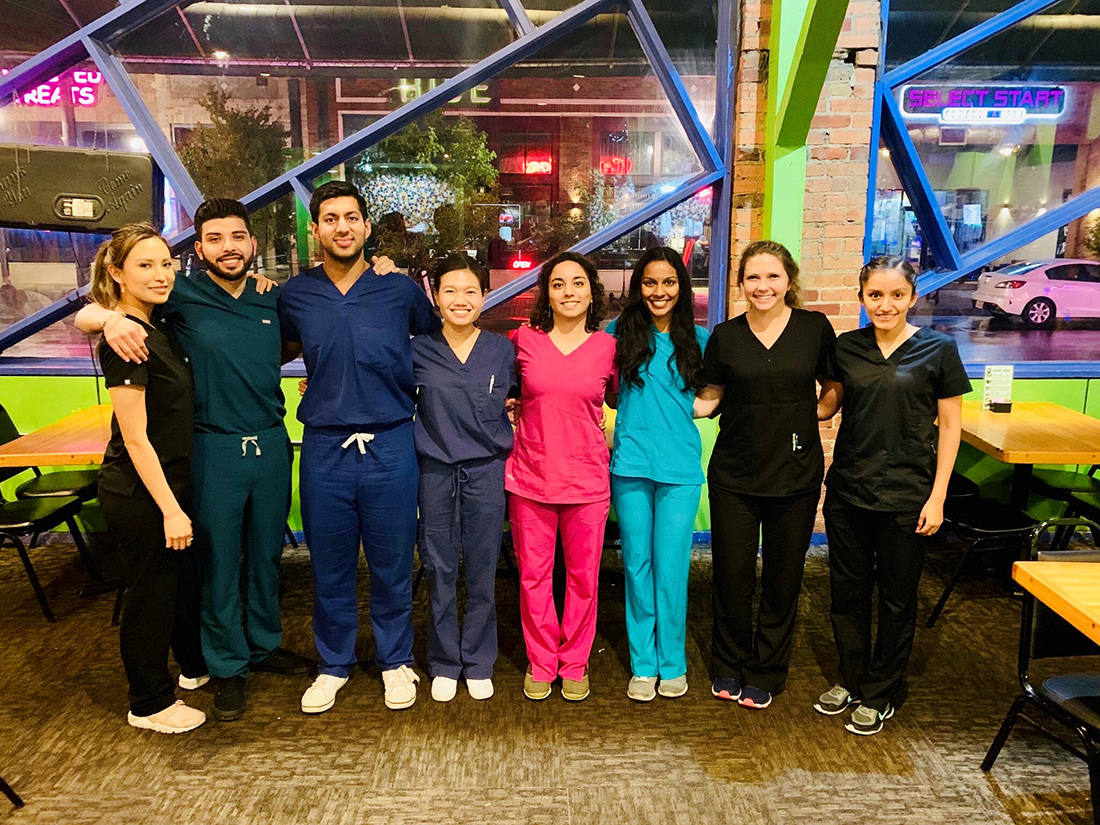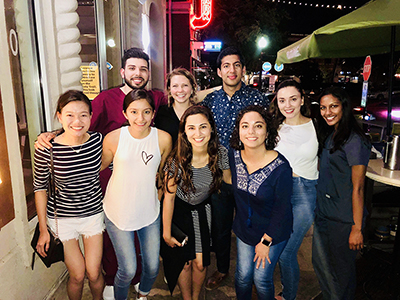‘Big’ benefits and ‘Little’ blessings

Every year in late April, the Office of Student Affairs invites sign-ups for the Big Sib/Little Sib program, a long-held tradition at Texas A&M College of Dentistry.
Current D1 students choose an incoming D1 to befriend and mentor. As with any good family, older “siblings” help their younger sibs navigate life—in this case, a strenuous first year of dental school.
One “family” in particular has grown twice as fast as the rest, and their bond is akin to the real deal.
In 2015, Jesse Torres chose entering student Husnain Shahid, now a D4, to be his “little.” With some students still on the list awaiting a “big,” Torres also adopted Emma Dang. (She and Torres, both University of Texas at Austin graduates, already knew each other from the UT predental program.)
Before summer’s end, Lettie Castaneda, who was starting her second year, decided she did indeed have time to be a “big” and asked Torres if he’d be willing to part with either Shahid or Dang.
“She said, ‘Can you give one of your “littles” away?’ We told her, ‘No, we don’t want to give one away. You can come join the family if you want,’ so she joined the family,” Shahid says. “Emma and I always joke, we have a mom and a dad.”
Instead of the typical two-student pairing, Torres and Castaneda mentored their “family” of four. They started bonding over Facebook messages, then on GroupMe and now in smartphone group texts.

It’s become tradition to meet for dinner biannually—at the beginning of the year and again at the end, Shahid says. Because D1s have hectic exam schedules, they have first dibs on where to dine, often staying within close proximity to the college.
The Torres-Castaneda family grew again in spring 2016 when Shahid and Dang chose Sandya Athigaman and Neusha Rahmati as their “littles,” respectively. Torres and Dang were happy to be reunited with Rahmati, also a friend from UT-Austin predental.
The beauty of how it’s worked out, Shahid explains, is that each “little” in their family not only gains two “bigs” but also a same-year sibling. Having someone in the same grade to relate to is a bonus. Another plus is how the students who recently went through the arduous D1 year share their fresh perspective and insight.
“With people who just went through it, it’s golden,” he says.
The support goes beyond first-year problems, he adds. When Rahmati expressed interest in running for president of the Academy of General Dentistry’s FellowTrack, a position Shahid held, he encouraged her: “Go for it. Go apply. You’ve got this.”
That support continued with the next generation as Athigaman chose Kalani Basham and Rahmati adopted Tania Ramezani. In Basham’s second year, Athigaman guided her in treating her first patient.
“She made it super easy for her,” Shahid says. “She walked her through the whole thing and showed her around.”
That helpful spirit continues to extend throughout the Torres-Castaneda family, from recent grads on down to D1s.
“I told my ‘littles’, ‘I’m fourth year and my schedule is really relaxed. If you guys ever need anything, or help with surgeries or whatever, you just let me know. I’ll take my time to make sure you’re taken care of,’” Shahid says.
As he nears graduation, he reaches out with real-world questions to Torres, who is now practicing dentistry in Dallas.
“I asked him some dental insurance questions,” Shahid says. “He does pediatric dentistry, so I get his advice on that type of stuff, too.” In turn, Shahid fields study questions from his own “littles.”
“There are no dumb questions,” he says. “That’s kind of what we wanted in our Big Sib/Little Sib group: no judgment. You can ask whatever you want.”
When it was Ramezani’s turn to choose a “little” in spring 2018, she selected a fellow University of Texas at Dallas grad; her best friend, Mahsa Maboudian. That same year, Basham chose Jamilex Carreno.
The family is about to grow again as the current D1s are ready to add a fifth generation to the Torres-Castaneda family.
Maboudian may follow family precedent by adopting two “littles.” With two friends coming in—one she knows from the predental society at UTD and another whom she met through the Persian community—choosing two would make more sense.
“I technically could if I wanted to. I think each student is allowed,” she says. “I could be one of those people.”